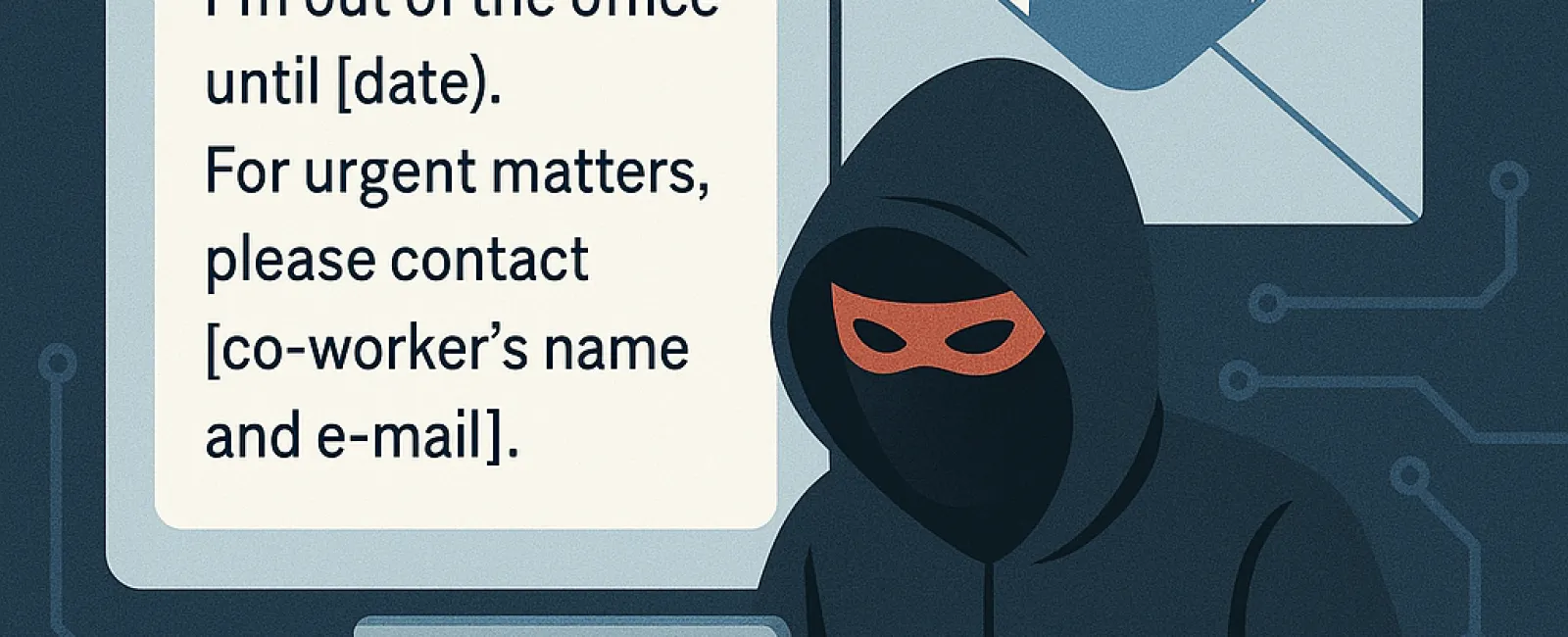June 16, 2025
Set your out-of-office reply and relax, but beware: while you pack for your trip, your inbox might be unintentionally sending out a beacon to cybercriminals:
"Hello! I'm away from the office until [date]. For urgent issues, please reach out to [coworker's name and e-mail]."
It seems harmless, even helpful.
But this very message is exactly what hackers love to exploit.
Your automatic reply, designed to keep communication flowing smoothly, inadvertently hands cybercriminals valuable information to launch attacks.
Consider what a typical out-of-office message reveals:
● Your full name and job title
● Dates when you're unreachable
● Alternate contacts including their emails
● Details about your internal team structure
● Even reasons for your absence (e.g., "I'm attending a conference in Chicago…")
This information arms cybercriminals with two critical advantages:
1. Perfect Timing: They know exactly when you're away and less likely to detect suspicious activities.
2. Precise Targeting: They can impersonate the right people and craft convincing scams tailored to your contacts.
These factors create an ideal setup for phishing or business email compromise (BEC) attacks.
Typical Scam Execution
Step 1: Your auto-reply is triggered and sent.
Step 2: A hacker uses this info to impersonate you or your designated alternate.
Step 3: They send a fraudulent "urgent" email requesting wire transfers, passwords, or confidential documents.
Step 4: Your colleague, unsuspecting, trusts the request as genuine.
Step 5: Upon your return, you discover unauthorized transactions, such as a $45,000 payment sent to a fake vendor.
Unfortunately, this scenario is more common than you'd expect and poses even greater risks for businesses with frequent travelers.
If your team includes executives or sales staff who travel often and rely on assistants or admins to manage communications during their absence, cybercriminals find a prime opportunity to exploit:
● Admins managing emails from multiple sources
● Handling sensitive tasks like payments and document processing
● Working quickly and trusting the identity of senders based on email content alone
A single well-crafted fake email can bypass these defenses, leading to costly security breaches or fraud.
Effective Strategies to Prevent Auto-Reply Exploitation
The answer isn’t to eliminate out-of-office replies, but to use them strategically and implement protective measures. Consider these best practices:
1. Keep Your Message Ambiguous
Avoid sharing detailed schedules or naming who is covering for you unless absolutely necessary.
Example: "I'm currently away and will respond upon my return. For immediate assistance, please contact our main office at [main contact info]."
2. Educate Your Team
Ensure your staff understands:
● Never process urgent requests involving money or sensitive data based solely on email instructions.
● Always verify suspicious or unusual requests through a secondary method, such as a phone call.
3. Deploy Advanced Email Security
Implement robust email filters, anti-spoofing technologies, and domain authentication to reduce impersonation risks.
4. Enforce Multifactor Authentication (MFA)
Activate MFA on all email accounts to block unauthorized access even if passwords are compromised.
5. Partner with a Proactive IT Security Team
Work with cybersecurity experts who monitor login attempts, detect phishing, and flag unusual behavior before damage occurs.
Enjoy Your Vacation Without Cybersecurity Worries
We specialize in creating cybersecurity solutions that protect your business, even when your team is out of office.
Click Here or Call Us at (949) 537-2909 to Schedule a FREE 10-Minute Discovery Call.
We'll evaluate your systems for vulnerabilities and guide you on securing your operations, so you can truly relax on your next vacation without fearing email scams.



